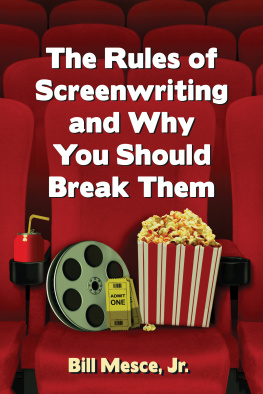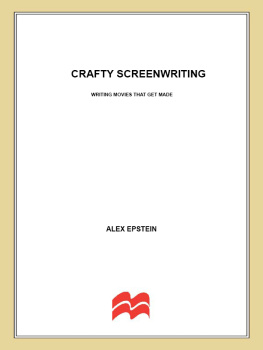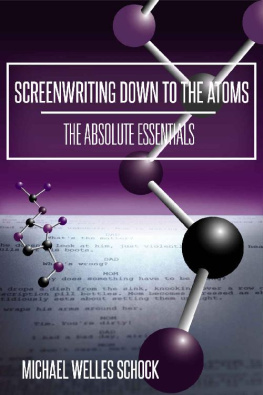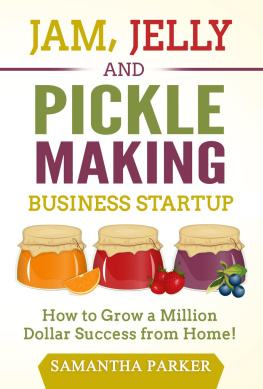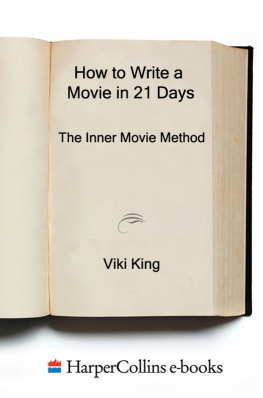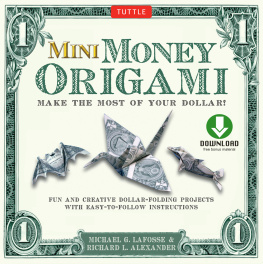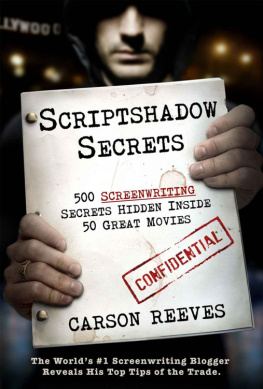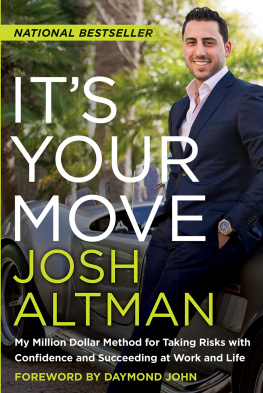Soth - Million dollar screenwriting : the mini-movie method
Here you can read online Soth - Million dollar screenwriting : the mini-movie method full text of the book (entire story) in english for free. Download pdf and epub, get meaning, cover and reviews about this ebook. City: Los Angeles, CA?, year: 2005, publisher: ScreenwritingU Press;Cubscribe Production, genre: Home and family. Description of the work, (preface) as well as reviews are available. Best literature library LitArk.com created for fans of good reading and offers a wide selection of genres:
Romance novel
Science fiction
Adventure
Detective
Science
History
Home and family
Prose
Art
Politics
Computer
Non-fiction
Religion
Business
Children
Humor
Choose a favorite category and find really read worthwhile books. Enjoy immersion in the world of imagination, feel the emotions of the characters or learn something new for yourself, make an fascinating discovery.

- Book:Million dollar screenwriting : the mini-movie method
- Author:
- Publisher:ScreenwritingU Press;Cubscribe Production
- Genre:
- Year:2005
- City:Los Angeles, CA?
- Rating:4 / 5
- Favourites:Add to favourites
- Your mark:
- 80
- 1
- 2
- 3
- 4
- 5
Million dollar screenwriting : the mini-movie method: summary, description and annotation
We offer to read an annotation, description, summary or preface (depends on what the author of the book "Million dollar screenwriting : the mini-movie method" wrote himself). If you haven't found the necessary information about the book — write in the comments, we will try to find it.
Soth: author's other books
Who wrote Million dollar screenwriting : the mini-movie method? Find out the surname, the name of the author of the book and a list of all author's works by series.
Million dollar screenwriting : the mini-movie method — read online for free the complete book (whole text) full work
Below is the text of the book, divided by pages. System saving the place of the last page read, allows you to conveniently read the book "Million dollar screenwriting : the mini-movie method" online for free, without having to search again every time where you left off. Put a bookmark, and you can go to the page where you finished reading at any time.
Font size:
Interval:
Bookmark:
MILLION DOLLAR SCREENWRITING
The Mini-Movie Method
By
Chris Soth
INTRODUCTION
In March of 1995, I was a graduate student at the University of Southern California, working hard on my thesis.
Luckily, I was in the Graduate Screenwriting Program and my thesis was a screenplay, the culmination of my two years of study there. I had a good idea and was working hard, for once it was going well. The techniques and methods drummed into me the previous year and a half were coming into play.
In addition, the professional connections that graduate school can sometimes provide were working for me as well, and an unusual confluence of events in the professional marketplace were coming to bear. There was interest from a major agency and one of the larger management firms in Los Angeles.
I poured on the steam, the ending just wasnt right. I rewrote an entirely new ending. I gave it a rewrite, I gave it a polish. I played with cover art. On April 3rd of 1995, I turned my thesis screenplay in for consideration to the powers that be at USC.
On April 4th, it sold.
I was lucky enough to book another job quickly afterward, adapting a novel for a mini-major studio. As I was doing rewrites for the first screenplay and meeting with a director to develop the second, we got the newsa major studio in town had attached talent to play our lead and were going to shoot the movie that summer. I was pressed into service for a quick rewrite of script number oneand after me, five other people weretwo teams and one very hot-at-that-time major screenwriter.
The movie opened, and with some luck and arbitration by the Writers Guild of America, I was awarded sole screenplay credit despite this plethora of other writers.
I continued work on the adaptation, working through the several rewrites our contract mandated over the next year, collecting payment with each step.
One day I went out to my mailbox. There was something I hadnt quite expected. My first movie had just gone to video and there was a residual check for me.
I did a little mental arithmetic. The check put me over the top. I had made over a million dollars as a screenwriter.
And you can too.
Im not saying it wont take luck, but thats the only thing you cant control, for which there may be no specific method available.
Everything else you can learn. It wasnt an accident that the story I sold was good, it was the result of specific methods and techniques which I reproduce for you here. I hope they will be as fruitful for you as they have been for me.
Chris Soth
http://www.MillionDollarScreenwriting.com
P.S. Im thrilled to announce an exciting new course from SreenwritingU that helps you write a movie in just 30 days with what youll learn in this book:
http://screenwritingu.com/mmm
P.P.S. Or your next great screenplay can be mentored live by me personally:
http://screenwritingu.com/screenplay-mentor
CHAPTER ONE
Lets jump into story.
I like to speak of story more as story theory, rather than a concrete set of rules and regulationsthere are many knowledgeable thinkers out there who have discussed and analyzed story at length, from Aristotle to Joseph Campbell and beyond, and in my opinion, these are our fellow story theorists and you should acquaint yourself with all of them, because you never know who or which will be of service to you.
Often they are talking about the same things and yes, there is a lot of overlap since the topic always is the same, but one author or theorist may be the one who writes it in such a way that you finally GET IT, or indeed, they may be onto something that none of the others have mined and that could be the key to the story you are working on right now. Always remembering, these are guidelines, not the lawand my rule about breaking rules is: if youre going to break a rule, make sure youre achieving a greater benefit than you would by just following the rule the first place.
First, well take a broad look at story theory in general, as all these theorists before us have, by trying to figure out first what most or ALL stories do. On our way well look at some other genres of story and try to figure out what ALL stories in those genres do...then perhaps, as we go on, we can distill it to a point of understanding what it is that YOUR story will and must do, and how. Finally well come to very concrete techniques for outlining story from beginning to end, and through that always-challenging middle.
First, a brief history of story. It is almost certain, by the way, that story itself predates written language. We have many examples of story, including The Odyssey and The Iliad, before they were written down, stories that are passed along through oral tradition, before we have any written recording of them and certainly before we have any written or critical analysis of what those stories do or why they work as well or as poorly as they do.
Dramatic theorists, in fact, believe the birth of drama may have been when human beings were hunter-gatherers.
A hunting party would go off and return with a kill, there would be some curious gruntings along the lines, by implication of Hey Og, whered you get the meat? Or, I was here earlier, no meat, here I am again, antelope carcass, what gives? and the members of the hunting party would stand up in front of the fire and provide a re-enactment of the hunt itself.
The gathering point of the fire, the light and warmth it provides, as well as lighting the drama, all presage properties of stage and even film drama today.
Therefore, it may be possible, overly interpreted grunts notwithstanding, that story not only precedes written language, but SPOKEN language as well.
Fast forwarding from these hominids several thousand years, 2500 or so years ago, Aristotle provided us with the first written record of story theory that we have in his fantastic document THE POETICS. Stories, again, existed before this, but this is perhaps the first extant writing ABOUT story itself, particularly stage drama. And this is pretty much the time, with a few earlier exceptions, that we have drama recorded in written formthe tragedies of Aeschylus, Sophocles, Euripides and the comedies of Aristophanes.
And in The Poetics, Aristotle takes on this question of what do all stories do?, especially dealing with tragedyit is believe he created another document on Comedy that is lost to us today.
And looking at it from the broadest possible generic point of viewremember we said wed attack this first from the angle of what ALL stories doAristotle posits a story graphic, a continuum, that, oversimplifying it, can be visually represented in a diagram a little bit like the one below:

Lets call this Aristotles Continuum. A horizontal line. This line merely represents time as is almost always the case with the horizontal axis of any graph.
Progression along the time line from left to right represents the passage of time. And Aristotle goes on to say that at the beginning of a storyat the left hand end of the graphalmost always, something is wrong, or if not, something GOES wrong quite early on.
The characters move along the time line, we move with them, events occur, they struggle against that problem, whatever it may be, and eventually, as we reach the far right end of the line whatever was wrong earlier is now made right, has resolved and balance has been restored.
This process occurs in ALL stories, be they comedic or tragicalways using as our definition of comedy a story that ends happily. Regardless of how laugh out loud funny it may or may not be.
So, either things work themselves out in a comedic manner, perhaps with lots of laughs along the way and no one really getting hurt, or in a tragic manner with horrible revelations, suicides, murders and the plucking out of eyes. But however it happens, comedically, tragically or anywhere on the vast and varied continuum in between, balance or equilibrium is restored at the end of the timeline.
Font size:
Interval:
Bookmark:
Similar books «Million dollar screenwriting : the mini-movie method»
Look at similar books to Million dollar screenwriting : the mini-movie method. We have selected literature similar in name and meaning in the hope of providing readers with more options to find new, interesting, not yet read works.
Discussion, reviews of the book Million dollar screenwriting : the mini-movie method and just readers' own opinions. Leave your comments, write what you think about the work, its meaning or the main characters. Specify what exactly you liked and what you didn't like, and why you think so.

